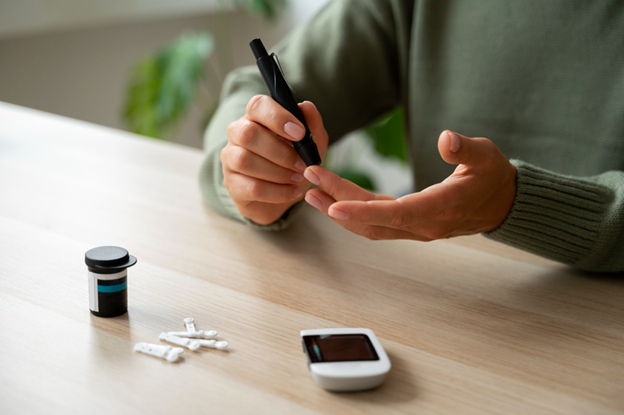What is Type 2 Diabetes?
Type 2 diabetes is a chronic condition that affects the way your body metabolizes sugar (glucose). Unlike people with type 1 diabetes, people with type 2 diabetes still produce insulin, but their bodies don’t use it effectively—a condition known as insulin resistance. Over time, the pancreas can’t keep up with the increased demand for insulin, and blood sugar levels rise.
This can lead to a range of health issues, including damage to the heart, kidneys, eyes, and nerves. Type 2 diabetes is more common in adults, but it’s also increasingly being diagnosed in children and adolescents, largely due to lifestyle factors such as diet and lack of physical activity.
Risk Factors for Type 2 Diabetes
Several factors increase your risk of developing type 2 diabetes, including:
- Age: The risk increases with age, particularly after 45 years.
- Family History: If you have a family member with type 2 diabetes, your risk is higher.
- Obesity: Being overweight is one of the biggest risk factors for developing diabetes, as it contributes to insulin resistance.
- Lack of Physical Activity: Physical inactivity can increase the risk of type 2 diabetes by contributing to weight gain and insulin resistance.
- Unhealthy Diet: A diet high in processed foods, sugary drinks, and unhealthy fats can increase the likelihood of developing diabetes.
- High Blood Pressure: Having high blood pressure or high cholesterol increases the risk of developing type 2 diabetes.
- Gestational Diabetes: Women who had gestational diabetes during pregnancy are at a higher risk of developing type 2 diabetes later in life.
Symptoms of Type 2 Diabetes
Many people with type 2 diabetes don’t experience noticeable symptoms, especially in the early stages. However, common signs of the condition may include:
- Frequent urination
- Increased thirst
- Unexplained weight loss
- Fatigue
- Blurry vision
- Slow healing of cuts or sores
- Numbness or tingling in the hands or feet
It’s important to note that the symptoms of type 2 diabetes can develop gradually, and some people may not notice them until complications arise.
Diagnosing Type 2 Diabetes
Type 2 diabetes is typically diagnosed through a series of blood tests that measure your blood sugar levels. The following tests are commonly used:
- Fasting Blood Sugar Test: Measures your blood sugar after an overnight fast. A reading of 126 mg/dL or higher suggests diabetes.
- Oral Glucose Tolerance Test (OGTT): Measures your blood sugar before and two hours after drinking a sugary solution. A reading of 200 mg/dL or higher after two hours suggests diabetes.
- A1C Test: This test measures your average blood sugar level over the past two to three months. A level of 6.5% or higher suggests diabetes.
Managing Type 2 Diabetes
Managing type 2 diabetes is crucial to prevent complications and improve your quality of life. Here are the primary ways to manage the condition:
- Blood Sugar Monitoring: Regularly checking your blood sugar levels helps you understand how your body is responding to various foods, activities, and medications.
- Healthy Eating: A balanced diet is vital in managing blood sugar levels. Focus on whole foods like vegetables, fruits, whole grains, lean proteins, and healthy fats. Avoid sugary snacks and processed foods.
- Regular Exercise: Physical activity helps improve insulin sensitivity and control blood sugar levels. Aim for at least 30 minutes of moderate exercise most days of the week.
- Weight Loss: Losing even a small amount of weight (5-10% of your body weight) can significantly improve insulin sensitivity and blood sugar control.
- Medication: In some cases, medication may be prescribed to help manage blood sugar levels. Your healthcare provider will recommend the best options based on your needs.
- Stress Management: Stress can raise blood sugar levels, so managing stress through relaxation techniques, yoga, meditation, or breathing exercises is important.
- Regular Checkups: Regular visits to your healthcare provider for blood tests, eye exams, and checkups are essential to prevent complications.
Preventing Type 2 Diabetes
While type 2 diabetes can often be managed with lifestyle changes, it’s even better to prevent it. Here are some tips to reduce your risk:
- Maintain a Healthy Weight: Losing weight if you’re overweight can significantly reduce your risk.
- Stay Active: Engage in regular physical activity, even simple activities like walking, swimming, or biking.
- Eat a Balanced Diet: Focus on a plant-based diet, with plenty of vegetables, fruits, whole grains, and healthy fats. Limit sugary foods and refined carbs.
- Limit Alcohol: Drinking excessive amounts of alcohol can increase your risk, so it’s best to drink in moderation, if at all.
- Quit Smoking: Smoking increases the risk of developing type 2 diabetes and can make managing the condition more difficult if you already have it.
Complications of Type 2 Diabetes
If left untreated, type 2 diabetes can lead to serious complications, including:
- Heart Disease: High blood sugar increases the risk of heart disease, including heart attacks and strokes.
- Kidney Damage: High blood sugar can damage the kidneys over time, leading to kidney disease or kidney failure.
- Nerve Damage: Poorly controlled blood sugar can damage the nerves, causing pain, numbness, or even amputations.
- Eye Problems: Diabetes can cause damage to the blood vessels in the eyes, leading to conditions like diabetic retinopathy and vision loss.
- Skin Conditions: People with diabetes are more likely to develop skin infections, dry skin, and other dermatological issues.
Conclusion
Type 2 diabetes is a manageable condition, but it requires commitment to a healthy lifestyle, including regular monitoring of blood sugar, maintaining a balanced diet, exercising regularly, and managing stress. Early diagnosis and treatment are essential for preventing complications, and with the right care, people with type 2 diabetes can lead a long, healthy life. Always consult with your healthcare provider to develop a personalized plan for managing your diabetes.
Consult us today at Myo Clinic for expert guidance!



